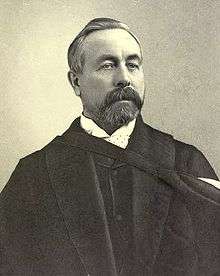Duncan McNab McEachran
Duncan McNab McEachran (27 October 1841 – 13 October 1924) as a Canadian veterinarian and academic.
Duncan McNab McEachran | |
|---|---|
 | |
| Born | 27 October 1841 Campbeltown, Scotland |
| Died | 13 October 1924 (aged 82) Ormstown, Quebec |
| Occupation | veterinarian, professor, author, school administrator, inspector, and stockbreeder |
Born in Campbeltown, Scotland, the son of David McEachran and Jean Blackney, McEachran graduated from the Edinburgh Veterinary College in 1861 and received his license to practice from Royal College of Veterinary Surgeons. In 1862, he emigrated to Canada West, settling in Woodstock. In 1863, he helped set up, along with primary founder Andrew Smith, the Upper Canada Veterinary School (later the Ontario Veterinary College). McEachran was a staff member but he considered the admission standards and academic requirements to be inadequate. He left after three years, moving to Montreal.[1] In 1867, Smith and McEachran again joined forces to publish the first veterinary textbook in Canada for farmers, The Canadian horse and his diseases.[2]
In 1866, McEachran assisted in the founding of the Montreal Veterinary College, including a French section in 1877, which became linked with McGill College, with its more advanced medical training facilities. By 1889, the relationship had been formalized. The college then became the Faculty of Comparative Medicine and Veterinary Science of McGill University.[3]
McEachran helped develop sanitary measures to counter epidemics in animals and made many trips to the US to study the prevention and treatment of such epidemics, particularly among horses. In 1885 he became the first chief veterinary inspector for Canada. In the late 1880s he helped establish two large horse breeding ranches in Alberta and then provided management for others from his home in Montreal.[4][5]
For his contribution to the field of agriculture in the province of Quebec and in Canada, McEachran was posthumously inducted to Canadian Agricultural Hall of Fame in 1962 and to the Agricultural Hall of Fame of Quebec in 1992.[6][7] He was named a National Historic Person by the federal government in 2016.[8]
References
- "Duncan McNab McEachran". Dictionary of Canadian Biography (online ed.). University of Toronto Press. 1979–2016.
- "Duncan McNab McEachran". News, Government of Canada. Government of Canada. 15 February 2016.
McEachran was asked by a former classmate to join the staff of Canada’s first veterinary college
- "Duncan McNab McEachran". News, Government of Canada. Government of Canada. 15 February 2016. Retrieved 25 January 2017.
- "Duncan McNab McEachran". News, Government of Canada. Government of Canada. 15 February 2016. Retrieved 25 January 2017.
McEachran was asked by a former classmate to join the staff of Canada’s first veterinary college
- Denis Goulet and Frédéric Jean (2003). "McEACHRAN, DUNCAN McNAB". Dictionary of Canadian Biography. University of Toronto/Université Laval. Retrieved 25 January 2017.
through his efforts in the fields of education and the prevention and treatment of animal diseases, helped improve the health of the country’s herds and rid them almost entirely of contagious diseases.
CS1 maint: uses authors parameter (link) - "Duncan McNab McEachran". News, Government of Canada. Government of Canada. 15 February 2016.
McEachran was asked by a former classmate to join the staff of Canada’s first veterinary college
- "Dr. D.M. McEachran (1841 - 1924)". cahfa.com/. Canadian Agricultural Hall of Fame Association. Retrieved 15 December 2014.
- "Docteur Duncan McNab McEachran". templeagriculture.org/ (in French). Agricultural Hall of Fame of Quebec. Retrieved 15 December 2014.
- Duncan McNab McEachran (1841-1924), Parks Canada backgrounder, 2016